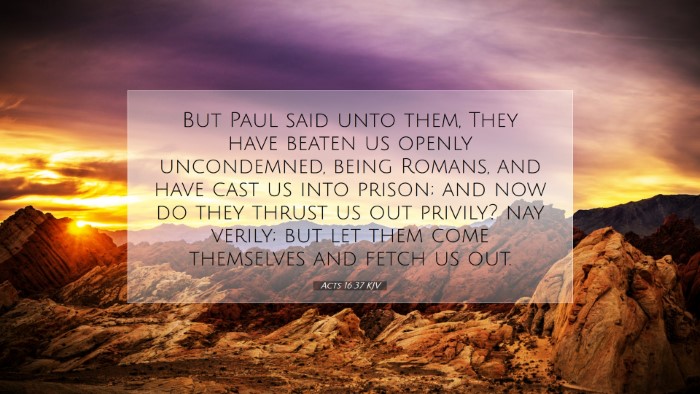Commentary on Acts 16:37
Text of the Verse: "But Paul said to them, 'They have beaten us publicly, uncondemned, men who are Roman citizens, and have thrown us into prison; and do they now throw us out secretly? No! Let them come themselves and take us out.'"
Introduction
The passage from Acts 16:37 is a pivotal moment in the life of the Apostle Paul during his missionary journey to Philippi. This verse highlights critical themes of justice, citizenship, and the proper response to unjust treatment. Various public domain commentaries provide valuable insights into the implications of this verse, which resonate meaningfully for pastors, students, theologians, and scholars alike.
Understanding the socio-political context of Roman citizenship and how it shaped early Christian experiences is crucial for interpreting this text. This commentary will examine the implications of Paul's declaration, the significance of Roman citizenship, and the broader themes that emerge from this narrative.
Insights from Matthew Henry
Contextualizing the Event: Matthew Henry emphasizes that this statement by Paul comes in response to the injustice of being beaten and imprisoned without a fair trial. His reference to his Roman citizenship serves as a defense against both humiliation and the threats posed by the authorities of the city. Henry notes that Paul’s appeal is not merely a worldly concern for his own comfort but also a stand for justice that could serve as a witness to others.
Defending Justice: According to Henry, Paul’s assertion that Roman citizens should not be treated in such a manner is significant. He argues that believers are to stand up against injustices and advocate for their rightful treatment, which draws a parallel to the conduct of Christians in facing persecution. Paul’s example teaches that while one might suffer for Christ, it is also essential to challenge wrongful actions.
Perspectives from Albert Barnes
The Roman Citizenship: Albert Barnes articulates the importance of Paul’s Roman citizenship in this narrative, indicating that it afforded him certain legal protections that others, including his accusers, may not have had. He reflects on the broader implications this had for the fledgling Christian church and their interactions with society's systems of power.
Pursuing Honor and Justice: Barnes adds that Paul’s call for the authorities to come and release him publicly serves to uphold his dignity instead of allowing a quiet dismissal. It indicates not only respect for his person as a Roman citizen but also asserts his rights against those who would violate them. This act of Paul upholds a principle that civil authorities should operate within the bounds of justice and legality, a reminder for modern-day believers to pursue justice within their communities.
Reflections from Adam Clarke
Legal Rights and Responsibilities: Adam Clarke provides an intricate analysis of the implications of Paul's status as a Roman citizen. He explains that such a high status ought to have guaranteed that Paul received a fair trial before any punishment was rendered. Clarke urges readers to recognize the essential balance that exists between one's spiritual identity and rights as a citizen of earthly jurisdictions.
Response to Injustice: Moreover, Clarke comments on Paul’s response in light of his missionary efforts. He underscores that Paul did not shy away from asserting his rights, which calls attention to the serious nature of mistreatment becoming a matter of public record. Clarke suggests that this act was purposeful, aiming to provoke thought among the authorities regarding their attitudes towards Christianity, thus presenting a moral challenge to the society of their day.
Theological Implications
Conflict Between Faith and Authority: The discourse in Acts 16:37 illuminates the complex relationship between faith and societal authority. It serves as an exhortation for believers to navigate this tension with wisdom. When facing injustice, Christians often grapple with how to assert their legal rights while maintaining their testimony of faith. This verse encourages a careful evaluation of when to comply with authority and when to stand firm against assertions that violate God-given dignity.
The Role of Citizenship in the Life of Believers: Furthermore, Paul’s citizenship can be interpreted as a metaphor for citizenship in the Kingdom of God. Just as he asserted his Roman citizenship, believers are called to recognize their identity in Christ, which transcends earthly allegiances. This serves as a reminder of the dual citizenship that every Christian holds and the responsibility that each has to act in accordance with their heavenly calling.
Practical Applications for Pastors and Theologians
- Encouraging Believers: Pastors can use Acts 16:37 to encourage congregations to stand boldly for truth and equity, fostering a community that advocates for the marginalized and addresses injustice within society.
- Education on Rights: Theological education can include discussions on the importance of understanding and advocating for civil rights, emphasizing how this aligns with Biblical principles.
- Equipping for Contextual Challenges: This passage can serve as an issue for ministers to address how to confront challenges to faith that intersect with societal authority gracefully and effectively.
Conclusion
Acts 16:37 encapsulates a critical moment of our faith’s history, demonstrating the need for justice, the significance of citizenship, and the appropriate response to authority. The insights provided by Matthew Henry, Albert Barnes, and Adam Clarke converge on the themes central to the Christian experience, urging current believers to reflect on their rights and responsibilities within their communities. As we engage with this text, may we embody the spirit of Paul, advocating for justice while remaining rooted in our identity as children of God.


